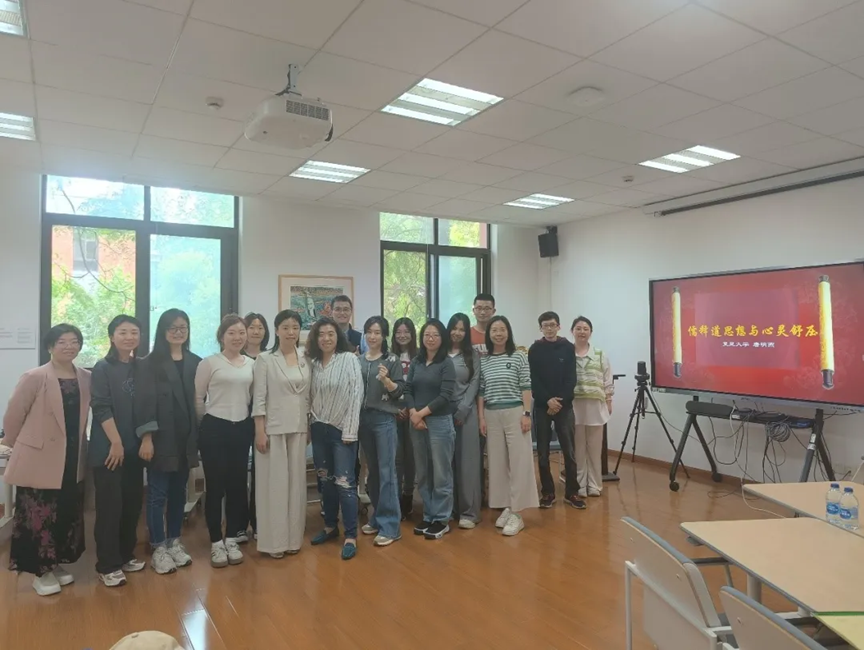
-
 86-21-63895588
86-21-63895588
-
 No.1, Lane 600, Nanchezhan Road, Huangpu District, Shanghai 200011
No.1, Lane 600, Nanchezhan Road, Huangpu District, Shanghai 200011
Release time:2025-05-01
FISF HAR May 1st 2025 08:20 Shanghai
On April 23rd 2025, the journey of growth for FISF employees set sail once again! This time, they were honored to have invited Teacher Mingyan Tang from the School of Marxism, Fudan University, who will lead us to start a warm journey of mental stress relief using cultural pleasantries.
At the beginning of the course, Teacher Mingyan Tang raised a soul-striking question, “where does stress come from?”, and analyzed the main sources of daily stress: the temptation of fame and fortune, unjust evaluations from others in the work place, troubles caused by various interpersonal conflicts in daily life, the unbreakable bond of fate, unforgettable departure and loss, inevitable aging and death. Tang told the group that they might not be able to change the facts that had exerted stress on us, but they could adjust the angles from which they regard these “sources of stress”, change the way they are interpreted, and empower ourselves to live a happy life by elevating one’s life realm, for which the relevant thoughts in Confucianism, Taoism and Buddhism could offer inspirations.
The stress-relieving wisdom in Confucianism
Teacher Mingyan Tang first expounded the classical proposition of “To remain unhurt when unrecognized – is this not true nobility?” from Confucianism. On one hand, she encouraged everyone to value external evaluations, striving to gain positive comments for themselves through active efforts so that they can acquire more development opportunities; and on the other hand, she reminded us to stay lucid, recognizing that external evaluations were just a “saying” after all, which, just as the saying goes, “There is undeserved praise, and slander that demands perfection as well.”, should not be emphasized too much as long as one is free from any compunction.
Moreover, Tang explained the views of “destiny” held by Confucianism. Confucianism believes in “determinism” but sniffs at “fatalism”, regarding one’s destiny recognizable. The process of “recognizing determinism” is to gradually clarify one’s life framework through active life practices; and it is demonstrated by the activities carried out within one’s own life framework, doing what one can and should do while keeping an open mind and not importuning what’s beyond the life framework.
Coordinating interpersonal relationships is one of the advantages of Confucianism. Combining The Analects of Confucius, Yuan’s Family Admonitions and other classic works, Teacher Tang laid out relevant philosophies in Confucianism upon mitigating family conflicts and handling leader-member relations.
The stress-relieving wisdom in Taoism
Taoism is filled with broad-mindedness, freedom, vividness and romance. It pursues a non-action and natural, retreating and latent, carefree and unrestrained spiritual realm with little selfishness and desire, hailing “mercy” (tolerance), “frugality” (contentment) and “not daring to be the first in the world” (benevolence and gentleness) as the basic principles of human behavior. The life philosophy of Taoism provides people in dilemma with a path towards spiritual liberation.
Tang meticulously conveyed the Taoist perspectives upon “being and non-being”, misfortune and fortune”, “softness and hardness”, “fame and freedom” and “life and death”, helping us to “change minds” and granting us heart cleansing and soul nourishing.
The stress-relieving wisdom in Buddhism
Originating in India and introduced to China in the Han Dynasty, Buddhism rapidly integrated with Chinese culture and has become a part of the traditional Chinese culture. Buddhism focuses on addressing the fundamental problem of “dukkha” (existential suffering) through its core doctrine of “dependent origination”, holding that “all phenomena arise independently through causes and conditions”. Every occurrence is a perfectly interwoven manifestation of these conditions, rendering excessive entanglement unnecessary. By embracing the principles of Anitya (impermanence) and Anatman (non-self), Buddhism provides a worldview that helps practitioners relinquish attachments to illusory permanence and the constructed ego - thereby alleviating the psychological roots of suffering. Through interpreting these Buddhist concepts, Teacher Tang aimed to edify us that: every person who enters one’s life and every event that unfolds is the manifestation of causes and conditions just in place, and when such causes and condition cease to sustain themselves, such person departs or such event concludes - for the causal matrix behind any outcome is infinitely complex, in instant creation annihilation. Thus, rather than clinging to relationships, one needs to attain growth through impermanence and meet change with serene discernment: a mind both rationally poised and equanimous.

At the end of the lecture, Teacher Tang patiently answered the questions raised by the students. After the course, they all expressed that they had gained a lot, not only learning a lot of philosophic wisdom from traditional Chinese culture which brought about stress relief and healing for the soul, but also arriving at solutions to various practical issues in daily life, achieving self-empowerment.